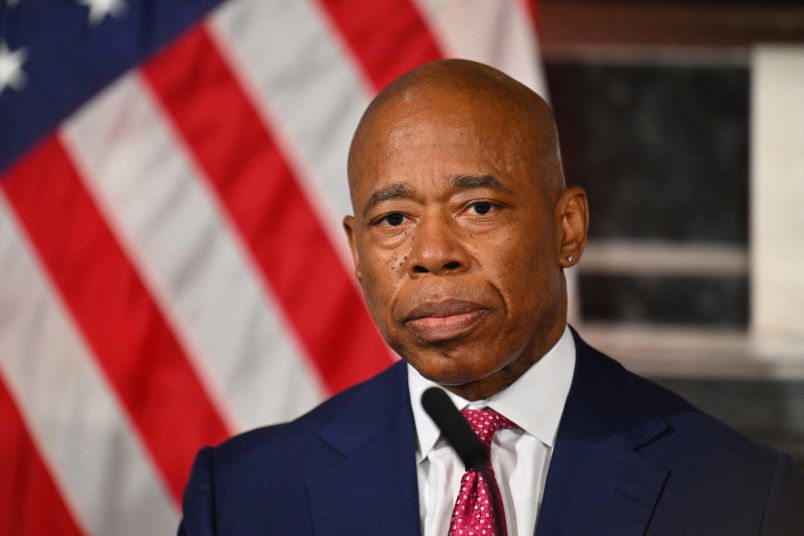Manhattan federal judge Dale Ho had limited options in the Eric Adams case.
On the one hand, he could have acceded to the DOJ’s wishes: dismiss the case without prejudice, but give federal prosecutors the opportunity to bring the same charges against the New York City mayor in the future.
Ho could have tried to stretch the limits of his own authority: decline to dismiss the case, and try to appoint a prosecutor to continue pursuing the charges. That would be fraught, with invite an immediate appeal, and would be unlikely to succeed.
But Ho chose a third option that allowed him to deny the Trump administration a key portion of the corrupt bargain that it sought to establish with Adams: on Wednesday he removed an easy source of leverage over the New York City mayor by dismissing the case against him with prejudice.
In doing so, Ho also strongly rebuked the DOJ’s actions in the case, describing a mix of incompetence and malice. He noted that then-acting deputy attorney general Emil Bove had taken the extremely out-of-the-ordinary step of appearing alone at a hearing in the case after several Manhattan federal prosecutors resigned, while no other government attorney whose name was on filings in the case would appear in person.
The Trump DOJ’s attempt to hold the threat of renewed prosecution against Adams, after moving to drop the case in February, stands as one of its most bizarre and convoluted efforts to use the federal government to throw its weigh around in never-before-tried ways — a particularly dramatic example among many other examples. It was mafia-style coercion mixed with federal policy: in exchange for having his corruption prosecution dropped, Adams would cooperate with the Trump administration on its legally questionable deportation initiatives. It would allow the federal government to reach down into local law enforcement matters, an intrusion that Ho called “troubling.”
Because on Wednesday Ho dismissed the charges with prejudice, the DOJ will be barred from bringing the same charges against Adams, removing, at least to some extent, its leverage over him. The plan to put his case on hold through a dismissal without prejudice was a key part of what made the deal appear corrupt on a number of levels, the judge wrote.
It’s “difficult to imagine a more egregious example of the kind of prosecutorial harassment” that federal law is supposed to prevent, Ho said. “Such an arrangement would be bad for Mayor Adams, and it would be bad for the people of New York City. And the Court cannot be complicit in it.”
Although Ho’s decision removes that formal source of leverage, it’s far from clear that its absence will have an effect on how Adams acts as mayor. At a press conference on Wednesday, Adams waved around a copy of FBI Director Kash Patel’s book “Government Gangsters” and urged every New Yorker to read it. Adams has not been known for subtlety during his tenure in Gracie Mansion.
Ho wrote in his order that even if he considered only what Bove told him in court and via filings, he would still have to dismiss the case with prejudice. The DOJ had claimed that the case deserved to be dismissed because the previous, Biden-appointed U.S. attorney Damian Williams had politicized the prosecution by touting it as one of his accomplishments after leaving office.
The obvious dubiousness of that argument aside, Ho decided to play along: if the DOJ were to bring the case again, would that not involve “precisely the kind of prosecutorial harassment” barred by federal law?
“But the bottom line is that, if the request for dismissal without prejudice constitutes an effort to obtain policy concessions from the Mayor on immigration enforcement, that is all the more reason to dismiss this case permanently,” Ho wrote.
He also addressed the so-called “policy” element of the bargain: cooperation with federal immigration authorities in the Five Boroughs. This is the first time in American history that Ho said he was aware of in which the government moved to drop charges against a public official over questions of “public safety, national security, or immigration.”
“The breathtaking implications of DOJ’s position — which were apparently well-understood by the numerous attorneys at USAO-SDNY and DOJ who resigned rather than sign this Rule 48(a) Motion — are difficult to square with the words engraved above the front entrance of the United States Supreme Court: ‘Equal Justice Under Law,'” the judge concluded.







All of the lawyers involved, on both sides of this case, but especially in the department of Justice, need to be sanctioned and referred to their respective bar associations.
It’s times like these that our adverserial system shows that it cannot stand up to real corruption. Makes me long for an ancient (maybe fictional) Chinese system where Judge Di Renjie would have ordered the corrupt officials to be pulled apart on all limbs by 4 water buffalo.